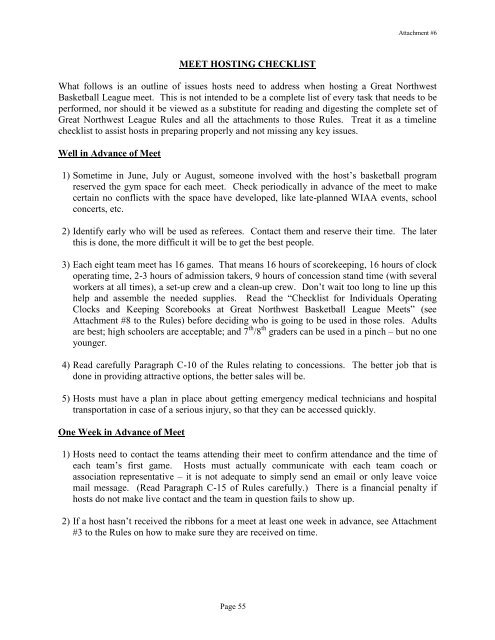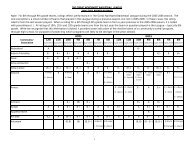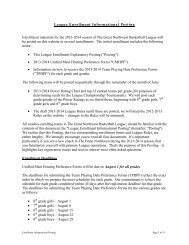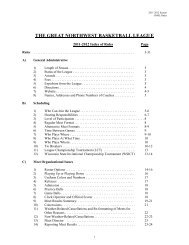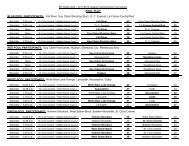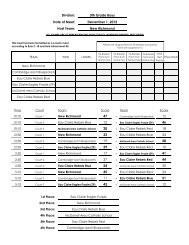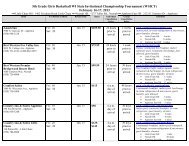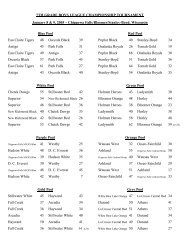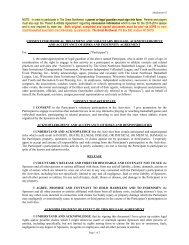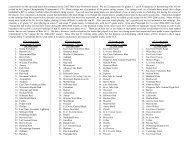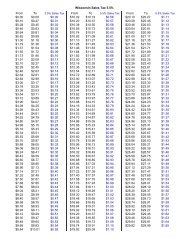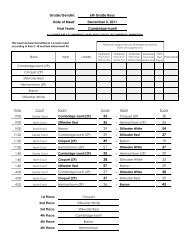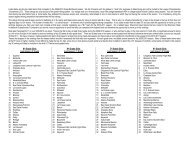6 - Meet Hosting Checklist - Great Northwest Basketball League
6 - Meet Hosting Checklist - Great Northwest Basketball League
6 - Meet Hosting Checklist - Great Northwest Basketball League
You also want an ePaper? Increase the reach of your titles
YUMPU automatically turns print PDFs into web optimized ePapers that Google loves.
Attachment #6<br />
MEET HOSTING CHECKLIST<br />
What follows is an outline of issues hosts need to address when hosting a <strong>Great</strong> <strong>Northwest</strong><br />
<strong>Basketball</strong> <strong>League</strong> meet. This is not intended to be a complete list of every task that needs to be<br />
performed, nor should it be viewed as a substitute for reading and digesting the complete set of<br />
<strong>Great</strong> <strong>Northwest</strong> <strong>League</strong> Rules and all the attachments to those Rules. Treat it as a timeline<br />
checklist to assist hosts in preparing properly and not missing any key issues.<br />
Well in Advance of <strong>Meet</strong><br />
1) Sometime in June, July or August, someone involved with the host’s basketball program<br />
reserved the gym space for each meet. Check periodically in advance of the meet to make<br />
certain no conflicts with the space have developed, like late-planned WIAA events, school<br />
concerts, etc.<br />
2) Identify early who will be used as referees. Contact them and reserve their time. The later<br />
this is done, the more difficult it will be to get the best people.<br />
3) Each eight team meet has 16 games. That means 16 hours of scorekeeping, 16 hours of clock<br />
operating time, 2-3 hours of admission takers, 9 hours of concession stand time (with several<br />
workers at all times), a set-up crew and a clean-up crew. Don’t wait too long to line up this<br />
help and assemble the needed supplies. Read the “<strong>Checklist</strong> for Individuals Operating<br />
Clocks and Keeping Scorebooks at <strong>Great</strong> <strong>Northwest</strong> <strong>Basketball</strong> <strong>League</strong> <strong>Meet</strong>s” (see<br />
Attachment #8 to the Rules) before deciding who is going to be used in those roles. Adults<br />
are best; high schoolers are acceptable; and 7 th /8 th graders can be used in a pinch – but no one<br />
younger.<br />
4) Read carefully Paragraph C-10 of the Rules relating to concessions. The better job that is<br />
done in providing attractive options, the better sales will be.<br />
5) Hosts must have a plan in place about getting emergency medical technicians and hospital<br />
transportation in case of a serious injury, so that they can be accessed quickly.<br />
One Week in Advance of <strong>Meet</strong><br />
1) Hosts need to contact the teams attending their meet to confirm attendance and the time of<br />
each team’s first game. Hosts must actually communicate with each team coach or<br />
association representative – it is not adequate to simply send an email or only leave voice<br />
mail message. (Read Paragraph C-15 of Rules carefully.) There is a financial penalty if<br />
hosts do not make live contact and the team in question fails to show up.<br />
2) If a host hasn’t received the ribbons for a meet at least one week in advance, see Attachment<br />
#3 to the Rules on how to make sure they are received on time.<br />
Page 55
Attachment #6<br />
3) Send referees the “Summary of Rules for Referees Officiating <strong>Great</strong> <strong>Northwest</strong> <strong>Basketball</strong><br />
<strong>League</strong> <strong>Meet</strong>s” (see Attachment #7 to the Rules) and encourage them to read this summary<br />
before the meet. They should also be sent a copy of Section D of the complete Rules.<br />
The Week Leading up to the <strong>Meet</strong><br />
1) Prepare meet summary results board, exactly as described in Paragraph C-9 of the Rules.<br />
Read and understand how the tie breaker system works.<br />
2) Read carefully Paragraph C-11 of the Rules in case of inclement weather. Hosts need to<br />
communicate thoroughly with teams on Friday evening and, if necessary, early Saturday<br />
morning.<br />
3) In case of bad weather or, for that matter, the very rare occurrence when a visiting team fails<br />
to show up, hosts must be thoroughly familiar with Attachment #5 to the Rules, which walks<br />
them through how to re-format a meet if that happens. (See also Paragraph C-18 of the<br />
Rules.) Don’t wait until Saturday morning to become familiar with these procedures.<br />
4) A host should talk to its school administration about making sure the gym floor is clean<br />
before the start of the meet. Dirty floors are slippery and dangerous and reflect poorly on the<br />
host school and community.<br />
The Day of the Event<br />
Before the <strong>Meet</strong> Starts<br />
1) Have the front door and gym doors open 45 minutes before the scheduled time of the first<br />
game. Teams travelling longer distances usually allow extra time and often arrive early.<br />
Have an admissions taker at the door by that time so revenue isn’t lost. (Conversely, hosts<br />
probably don’t need an admissions person after halftime of the second game – few new<br />
people will arrive after that.)<br />
2) Hosts need two quality leather game balls at each scorer’s table, fully-inflated. For all girls<br />
meets and for 6 th grade, 5 th grade and 4 th grade boys meets, use the standard-sized “women’s”<br />
(28.5”) ball. For 7 th and 8 th boys meets, use the standard-sized “men’s” (30.0”) ball.<br />
3) At each scorer’s table, besides a fully-functioning clock, hosts also need the following items:<br />
• A copy of the “Summary of Rules for Referees Officiating <strong>Great</strong> <strong>Northwest</strong> <strong>Basketball</strong><br />
<strong>League</strong> <strong>Meet</strong>s” – encourage referees to read if they haven’t already – or re-read if they<br />
have the time.<br />
• Sections C and D of <strong>League</strong> Rules.<br />
• A copy of the “<strong>Checklist</strong> for Individuals Operating Clocks and Keeping Scorebooks at<br />
<strong>Great</strong> <strong>Northwest</strong> <strong>Basketball</strong> <strong>League</strong> <strong>Meet</strong>s” – have each of the scorekeepers and clock<br />
operators read thoroughly before starting.<br />
• A scorebook and several sharpened pencils or mechanical pencils.<br />
• A manual possession arrow unless the clock operator has access to, and can operate, the<br />
possession arrow on the clock.<br />
Page 56
Attachment #6<br />
4) Make certain that the clock operators know how to operate the clock. Lots of problems can<br />
develop if they don’t.<br />
5) Make certain that the “<strong>Meet</strong> Director’s” name is posted on the “<strong>Meet</strong> Results Summary”. It’s<br />
always a nice touch to have that person introduce himself/herself to each coach before their<br />
first game so the coaches know who to go to if they have a question or problem.<br />
6) If any of the playing surfaces that will be used do not have permanent 3-point lines, hosts<br />
need to put down tape as described in Paragraph C-19. For 5 th grade and Pioneer Division<br />
meets, hosts need to put down tape to create a 13 foot free throw line (See Paragraph D-11 of<br />
the Rules). Also, if playing cross-court on a divided gym, see Paragraph C-20 of the Rules<br />
about how to assure proper center court and sidelines.<br />
7) There will be minor injuries. Try to have an ice supply (most hosts do so at the concession<br />
stand) with some zip-lock baggies for those teams not traveling with ice.<br />
During the <strong>Meet</strong><br />
1) If there is a serious injury and EMTs or an ambulance are called, the player’s parent(s), if<br />
there, should be found immediately. If not present, ask the player’s coach for the signed<br />
copy of the “Consent for Medical Treatment” from that player’s parents (See Paragraph C-17<br />
of the Rules and Attachment #2 to the Rules).<br />
2) Post scores promptly on the <strong>Meet</strong> Results Summary as described in Paragraph C-9. Write the<br />
exact score next to the team name in each match-up on the summary chart. Then, list the<br />
wins/losses and “points” earned above. It’s critical that hosts post the exact score of each<br />
game and the “points” earned, so that if the tie breaker is imposed later on, it can be quickly<br />
calculated. If a host is using playing surfaces in two different buildings, make sure there is a<br />
means of quickly getting scores from games in one building to the next, so that coaches, etc.<br />
in both buildings know what’s going on elsewhere. All scores should be posted in all<br />
locations within 15 minutes after each game and immediately after Round 3 of the roundrobin<br />
games for Group B. We recommend that hosts post results in pencil. Almost everyone<br />
makes a mistake and ink or Sharpie marks are extremely difficult to correct.<br />
3) Hosts need to thoroughly familiarize themselves with the revised tie breaker rules for the<br />
2011-2012 season as detailed in Paragraph B-10. This is the first year of this major rule<br />
change. In brief, whenever only two teams are involved in a tie, the winner of the head-tohead<br />
game wins the tie breaker. When three teams are tied with the same game record, the<br />
highest seeded team is chosen by comparing "point differential earned" and the next two are<br />
chosen by head-to-head competition. In other words, whenever there is a game record tie<br />
between only two teams who played each other, head-to-head play breaks the tie. In a case<br />
where two teams are tied who did not play each other, the tie is broken by comparing "point<br />
differential earned."<br />
4) Make sure the ribbons are at the scorer’s table on a timely basis for distribution after each<br />
team’s last game.<br />
Page 57
Attachment #6<br />
5) If a visiting team violates Paragraph C-10 of the Rules by bringing in food and liquid (unless<br />
it’s liquid to be consumed by the team during the games), a host needs to make sure they file<br />
a written complaint. Whether or not the coach of that team is confronted during the meet is<br />
up to each host.<br />
6) Don’t forget that the host must report the exact scores of all games by 10:00 a.m. the next<br />
Monday (and, preferably, even earlier). Make sure that whoever is reporting these scores<br />
takes home with him/her the <strong>Meet</strong>s Results Summary (or, in the alternative, the scorebooks).<br />
If the person submitting the scores to the <strong>League</strong> is going to rely on the <strong>Meet</strong> Results<br />
Summary, make sure the scores of all the 4 th round games get properly posted on this<br />
Summary before that person leaves the gym on Saturday evening.<br />
Within 24 Hours After the <strong>Meet</strong><br />
1) A host needs to read carefully about its obligation to report exact scores of all games within a<br />
day and a half after the close of the meet (see Paragraph C-14 of the Rules). Failure to do so<br />
carries with it a financial penalty which will be automatically applied – no exceptions.<br />
2) If there were any serious injuries or really noteworthy negative incidents at a meet, please<br />
call Terri Green (715-386-4317) Saturday evening, immediately after the meet concludes.<br />
Later, After the <strong>Meet</strong><br />
At almost every meet, something occurs that could be improved. If one of the teams hosted has a<br />
complaint, they will probably complete a complaint/suggestion form (see Paragraph C-16 of the<br />
Rules). A host needs to do the same relative to the conduct of its guests so that we can try to<br />
improve the overall quality of <strong>League</strong> meets.<br />
Page 58


